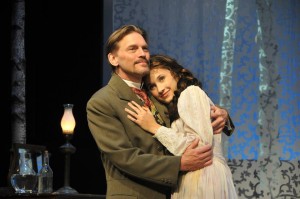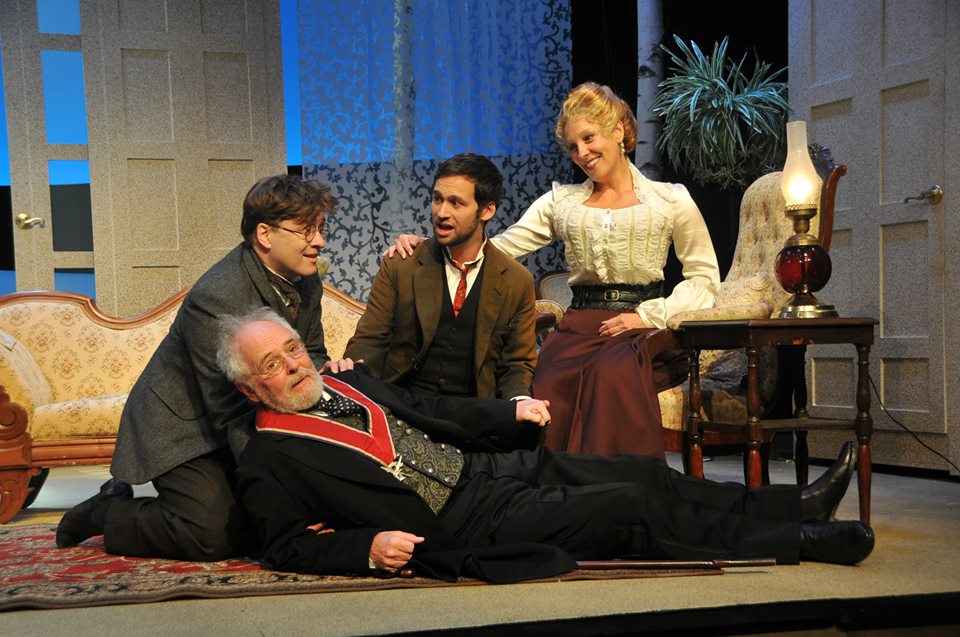Theater Review: The Peterborough Players Stage a “Seagull” That Soars
The Peterborough Players have put together a Seagull that floats elegantly on nineteenth-century Russian and twenty-first-century American wings, simultaneously bright and dark.
Seagull by Anton Chekhov, in a new version by Gus Kaikkonen. Directed by Kaikkonen. Staged by the Peterborough Players, Peterborough, New Hampshire, through August 4.
By Jim Kates.

Trigorin (Jack Koenig) embraces Nina (Erin Neufer) in the Peterborough Players staging of “Seagull.” Photo: Deb Porter-Hayes.
What has puzzled people about Anton Chekhov’s Seagull from the very beginning is why the playwright called it a comedy. Chekhov even quarreled with Stanislavsky for taking the play too seriously in its second—and successful—production. Some have read “comedy” in the sense of Dante’s Divine or Balzac’s Human, Comedies, others in the sense of Horace Walpole’s “This world is a comedy to those that think, a tragedy to those that feel.” Still others find in the label a distinctively Russian defense against irony. It can also be seen as a comedy of humors, with the dominant humor being self-absorption, all of the characters infected to a greater or lesser degree by an unhappy narcissism. Nevertheless, the tension that runs between the play’s playfulness and its darker underside has engaged and plagued theatergoers, readers, and directors for more than a century now.
This has made The Seagull seem more complicated than it is. Without clear signposts, bemused audience members mutter about “the Russian soul,” when they might simply sit back and listen to the life on stage, which Chekhov tried to portray in a way that minimized rather than heightened theatricality.
What he aimed for was a naturalness and simplicity in writing and staging that belied both the writer’s and the actor’s trade of his time. In a letter to his fellow playwright Gorky, Chekhov wrote, “It’s understandable when I write, ‘A man sat down on the grass’; this is understandable because it’s clear and doesn’t draw attention to itself. On the other hand, it’s confusing and mentally oppressive when I write, ‘A tall, narrow-chested man of medium build with a red beard sat down on the green grass already trampled and turned brown by people walking on it—sat down silently, and shyly and timidly looked around.’” In the last act of The Seagull, the young writer Constantine explicitly invokes these differences in theatrical imagination; and in the productions Chekhov envisioned of his work, he wanted the presence of the unaffected to dominate. Some of the best productions of Chekhov plays I’ve seen have been the most amateur; that is, the most artless. Trained actors sometimes strain too hard.
The Peterborough Players avoid this trap. The clarity and directness of this production serves The Seagull well, understanding it not as a classic of a foreign literature but as an interaction of bewildered characters stumbling through their lives.
Gus Kaikkonen has proved himself before this to be a remarkably adept translator and adapter for the current stage. He didn’t create this production of The Seagull directly from the Russian text but confected it from a number of older English translations, adapting these as if making a translation—one that stays remarkably true to its distant original while feeling streamlined, contemporary, and true also to a Chekhovian ideal. Then he has directed it with a strong sense of the comic potential and a comfortable use of the particular strengths of veterans of the Peterborough Players company, with a bright sprinkling of newcomers.
Thus Kraig Swartz brings a familiar, manneristic whine to the role of the hapless schoolmaster Medvedenko, and Michael Page a bemused, red-faced bluster to his turn as Sorin, the brother of the fading actress Irina Arkadina (Lisa Bostnar), whose entourage includes the popular novelist Boris Trigorin (Jack Koenig).

Medvedenko (Kraig Swartz), Sorin (Michael Page), Konstantine (Jed Resnick), Arkadina (Lisa Bostnar) in the Peterborough Players production of SEAGULL. Photo: Deb Porter-Hayes.
Bostnar and Koenig make a beautifully matched pair as Arkadina and Trigorin, playing both of these creatures of self-absorption with a sympathy that leads you almost to fall for them—Trigorin in the second act and Arkadina in the third. (This production calls the acts “scenes.”) In some productions, Arkadina can come across as monstrous and Trigorin as callous, but Bostnar and Koenig subordinate these qualities to a basic humanity. Tim Clark works out very professionally as Doctor Dorn—I think it’s the finest performance I’ve ever seen him give—and the youngest of veterans, Jed Resnick, gives us a suitably determined and weak Constantine, aspiring not only to enter but to remake the world of his elders. The newcomers to note are Talene Monahon playing the proto-goth Masha with straightforward integrity, and, in particular, Erin Neufer as Nina Zarechnaya, who begins in innocence and ends in experience. Neufer’s uncomfortable laugh carries a great deal of weight from beginning to end; and I’m just sorry that, in her last scene with Constantine, Neufer misses the strength in Nina’s acceptance of her new life; she seems to only recognize the defeat. This is a crucial scene, and I think it’s partly because he feels her life-force as well as her loss that Constantine is led to the action that ends the play.
Kaikkonen’s direction has also caught some subtle, lovely effects, as when Irina reaches out to touch Masha and just misses when the younger girl turns away from her; and these more than balance a few little uncomfortable bits, like Page’s and Dale Hodges’ inexplicable British accents, as inconsequentially out of place as the fitted sheet on Sorin’s bed.
Russians get particularly possessive about a few of their writers, among them Chekhov. But Kaikkonen and the Players have put together a Seagull that floats elegantly on nineteenth-century Russian and twenty-first-century American wings, simultaneously bright and dark, a model of the best work of the Peterborough company in its own 80th season.
